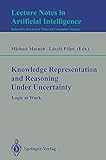Knowledge Representation and Reasoning Under Uncertainty [electronic resource] : Logic at Work / edited by Michael Masuch, László Pólos.
Material type: TextSeries: Lecture Notes in Computer Science, Lecture Notes in Artificial Intelligence ; 808Publisher: Berlin, Heidelberg : Springer Berlin Heidelberg, 1994Description: X, 242 p. online resourceContent type: text Media type: computer Carrier type: online resourceISBN: 9783540484516Subject(s): Computer science | Artificial intelligence | Computer Science | Artificial Intelligence (incl. Robotics) | Mathematical Logic and Formal LanguagesAdditional physical formats: Printed edition:: No titleDDC classification: 006.3 LOC classification: Q334-342TJ210.2-211.495Online resources: Click here to access online
TextSeries: Lecture Notes in Computer Science, Lecture Notes in Artificial Intelligence ; 808Publisher: Berlin, Heidelberg : Springer Berlin Heidelberg, 1994Description: X, 242 p. online resourceContent type: text Media type: computer Carrier type: online resourceISBN: 9783540484516Subject(s): Computer science | Artificial intelligence | Computer Science | Artificial Intelligence (incl. Robotics) | Mathematical Logic and Formal LanguagesAdditional physical formats: Printed edition:: No titleDDC classification: 006.3 LOC classification: Q334-342TJ210.2-211.495Online resources: Click here to access online  E-BOOKS
E-BOOKS
| Current library | Home library | Call number | Materials specified | URL | Status | Date due | Barcode |
|---|---|---|---|---|---|---|---|
| IMSc Library | IMSc Library | Link to resource | Available | EBK6479 |
The role of expectations in reasoning -- On logics of approximate reasoning -- Gentzen sequent calculus for possibilistic reasoning -- A model of inductive reasoning -- Automated reasoning with uncertainties -- An axiomatic approach to systems of prior distributions in inexact reasoning -- Contradiction removal semantics with explicit negation -- Logic programming for non-monotonic reasoning -- Agent oriented programming: An overview of the framework and summary of recent research -- An application of temporal logic for representation and reasoning about design -- Knowledge theoretic properties of topological spaces -- Rough logic for multi-agent systems -- A logical approach to multi-sources reasoning -- Situation theory and social structure.
This volume is based on the International Conference Logic at Work, held in Amsterdam, The Netherlands, in December 1992. The 14 papers in this volume are selected from 86 submissions and 8 invited contributions and are all devoted to knowledge representation and reasoning under uncertainty, which are core issues of formal artificial intelligence. Nowadays, logic is not any longer mainly associated to mathematical and philosophical problems. The term applied logic has a far wider meaning, as numerous applications of logical methods, particularly in computer science, artificial intelligence, or formal linguistics, testify. As demonstrated also in this volume, a variety of non-standard logics gained increased importance for knowledge representation and reasoning under uncertainty.


There are no comments on this title.